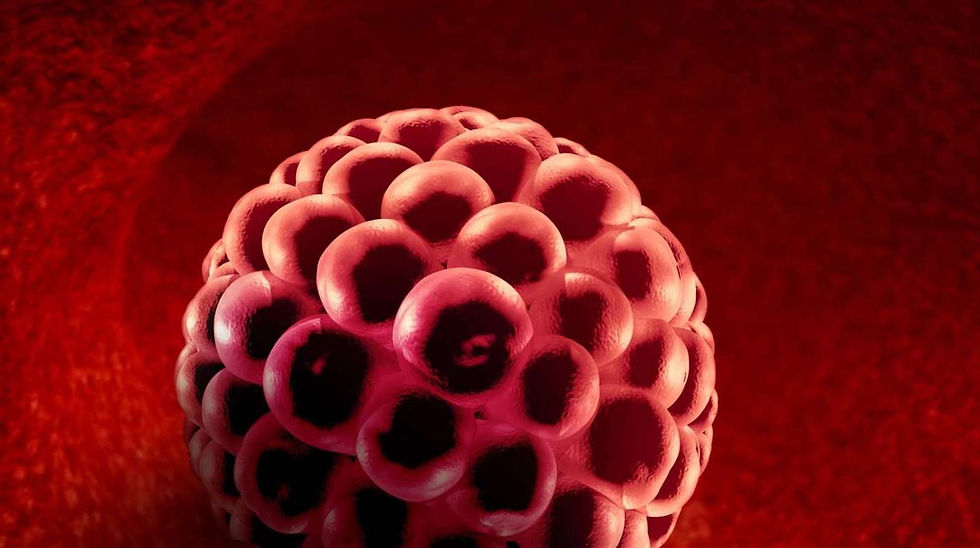Vaginal Dysbiosis and Fertility
- Dr. Jaime DeGuzman, DTCM, L.Ac

- Jul 27
- 3 min read
Most of us know that a healthy amount and type of bacteria (microbiome) in our colon play an important role in maintaining overall health, but not everyone is aware that a healthy vaginal microbiome is crucial for a female reproductive health.

Background
Just as the right bacteria in our gut can help us with digestion, nutrient absorption, immune system regulation, and protecting us against harmful pathogens, the right bacteria in the vagina can facilitate conception by promoting optimal sperm movement. However, an imbalance of the good bacteria (dysbiosis) allows the prevalence of the bad bacteria, negatively impacting fertility by reducing the ability of sperm to fertilize the egg.
Introduction
Due to the intricate balance of the vaginal microbiome, bacterial vaginosis (BV) is documented as the leading cause of vaginal dysbiosis. A paper published in 2022 by Cureus mentions that Bacterial Vaginosis is one of the most common vaginal infections in women of childbearing age. Affecting one-third of women globally, BV has significant implications for both reproductive and overall health. According to a review by Frontiers in Cellular and Infection Microbiology, BV is considered a risk factor for pelvic inflammatory disease (PID) which can cause serious reproductive consequences, such as infertility, chronic pelvic pain, and ectopic pregnancy.
Vaginal Microbiome
The microbiome of a healthy vagina is composed of different types of bacteria. The dominant bacteria are of the Lactobacillus species, which are known for their protective functions. The top four Lactobacillus species are: Lactobacillus crispatus, Lactobacillus jensenii, Lactobacillus gasseri, and Lactobacillus iners. All of these bacteria produce lactic acid, which helps to maintain a low (acidic) vaginal pH - inhibiting the growth of harmful bacteria and fungi. In addition, some of them also produce hydrogen peroxide - which can further contribute to the antimicrobial environment.
Vaginal Dysbiosis
Vaginal dysbiosis refers to an imbalance in the normal vaginal microbiome - a shift away from the beneficial Lactobacillus species and towards an overgrowth of other bacteria such as Gardnerella, Atopobium, Prevotella, and Ureaplasma. When these bacteria overgrow, they disrupt the natural balance of the vaginal microbiome, decreasing the production of lactic acid and hydrogen peroxide - which are important for maintaining a healthy acidic environment. The overgrowth of these bacteria not only leads to inflammation, but also impairs sperm motility and viability. An article published in 2024 by Reproductive Biomedicine concluded that:
“ Vaginal microbiome dysbiosis influences partner's sperm motility”.
Vaginal Dysbiosis is Frequently Asymptomatic
A study by Nutrients published in 2023, aimed to investigate whether administering probiotic (Lactobacillus species) could improve vaginal dysbiosis in asymptomatic women, not only confirmed that a number of Lactobacillus species can be used to treat vaginal dysbiosis, but it also showed that in a significant portion of women with vaginal dysbiosis, often associated with bacterial vaginosis (BV), can be asymptomatic. The study mentioned that while some women experience symptoms like increased discharge, odor, or irritation, many others with dysbiosis show no noticeable signs or symptoms. From a fertility point of view, this is problematic since several studies show that vaginal dysbiosis impairs sperm motility and viability. This Research in particular highlights the importance of a balanced vaginal microbiome in optimizing conditions for sperm survival and function.
“ Dysbiosis, characterized by an imbalance in microbial communities, can significantly impact fertility by altering the local immune response, affecting sperm viability, and disrupting hormonal and reproductive organ functions.”.
Testing for Vaginal Dysbiosis
There are several at-home kits that can be ordered online. One of my favorites is the one by Evvy. Their at-home vaginal microbiome test uncovers 700+ bacteria & fungi with one swab. The test includes four Microbiome Markers associated with fertility outcomes.
TCM and Vaginal Dysbiosis
In Traditional Chinese Medicine (TCM), vaginal dysbiosis is often viewed as a manifestation of "Damp-Heat" in the body. Other patterns such as “Spleen Qi Deficiency” and “Kidney Yin Deficiency” are usually found as well in patients with this condition. Many Chinese herbs have both antimicrobial and anti-inflammatory effects and are combined to create an herbal formula that not only treats the infection, but also the underlying imbalances that might contributing to vaginal dysbiosis. In addition to treating this condition with Chinese herbal formulas, acupuncture is always given to strengthen Spleen Qi and nourish Kidney Yin.
Conclusion
There’s plenty of research available showing how vaginal dysbiosis affects sperm motility and viability, negatively impacting fertility. Being that this condition is typically asymptomatic, it is one of the last conditions to check – if at all, when someone is experiencing difficulties in trying to conceive.






Comments